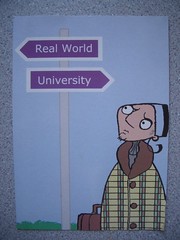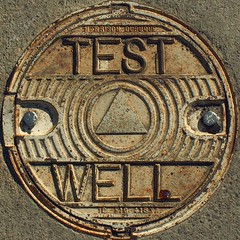 I’ve been inspired!
I’ve been inspired!
More on the inspiration later, but first two things: Yesterday on a whim (since it has nothing to do with my usual ed/tech/art ramblings) I posted a blog entry that included 20 things about myself … but one of them was a lie. I invited readers to guess which one is false, and at the time I’m writing this 4 people have made their guesses but no one’s gotten it right, yet. If you feel like playing along, you can go here.
Next up, I’m cross-posting this on Teachers 2.0 strictly for item three on today’s agenda. Teachers 2.0 is a much larger community, as evidenced in more than one significant way, and I really want to hear people’s feedback. You can comment here or there, although to be honest more people might read your response if you post it there.
-=-=-=-=-
 Ok, on to the heart of today’s episode. In the past I’ve expressed mixed feelings about high stakes standardized testing. I feel that our goal as educators should be to prepare students to be successful in the “real world,” and that teaching to the test (which seems to be an inevitable outcome of this kind of assessment) does not do this – especially if and when the test itself is not assessing skills that will be required in the real world.
Ok, on to the heart of today’s episode. In the past I’ve expressed mixed feelings about high stakes standardized testing. I feel that our goal as educators should be to prepare students to be successful in the “real world,” and that teaching to the test (which seems to be an inevitable outcome of this kind of assessment) does not do this – especially if and when the test itself is not assessing skills that will be required in the real world.
People in the U.S. reading this now may immediately think of NCLB, but I was teaching before that legislation passed I recall high stakes assessment being disproportionately emphasized back then, too.
 Now in the past every time I expressed this opinion, I added that while I dislike tests like this I feel I can’t complain too much because it’s difficult to think of another way to compare schools from year to year across a district, county, or nation without some sort of one-size-fits-all non-subjective bar with which we can measure student achievement.
Now in the past every time I expressed this opinion, I added that while I dislike tests like this I feel I can’t complain too much because it’s difficult to think of another way to compare schools from year to year across a district, county, or nation without some sort of one-size-fits-all non-subjective bar with which we can measure student achievement.
But the other day, I put two and two together. What’s our goal again? To prepare students for the real world. So how should we assess them? How about by looking at how they perform in the real world, or at least in response to real world situations.
What if, instead of subjecting our students to tests that stress out everyone involved, we created some form of rubric to evaluate how they do after they stop calling themselves students? The rubric could include things like salary, job satisfaction, and any one of a number of variables that we apply to ourselves when we ask ourselves if we think we’ve been successful.
Of course if we adopted this system there would still be some problems. True assessment would not be able to be measured until they were no longer our students, thus keeping us from correcting discrepancies that a well written standardized test may have caught. Maybe a combination of the two? I don’t know.
I’m not saying this is the perfect solution. I’m not even saying I’ve thought this completely through yet, but it is something I’ve been mulling over, and I’d love to hear your opinion on the whole thing. What have I overlooked? Why would or wouldn’t this type of assessment be a good idea? If it was your job to create the real life rubric, what would be the core variables worth measuring?
Inquiring minds want to know.
